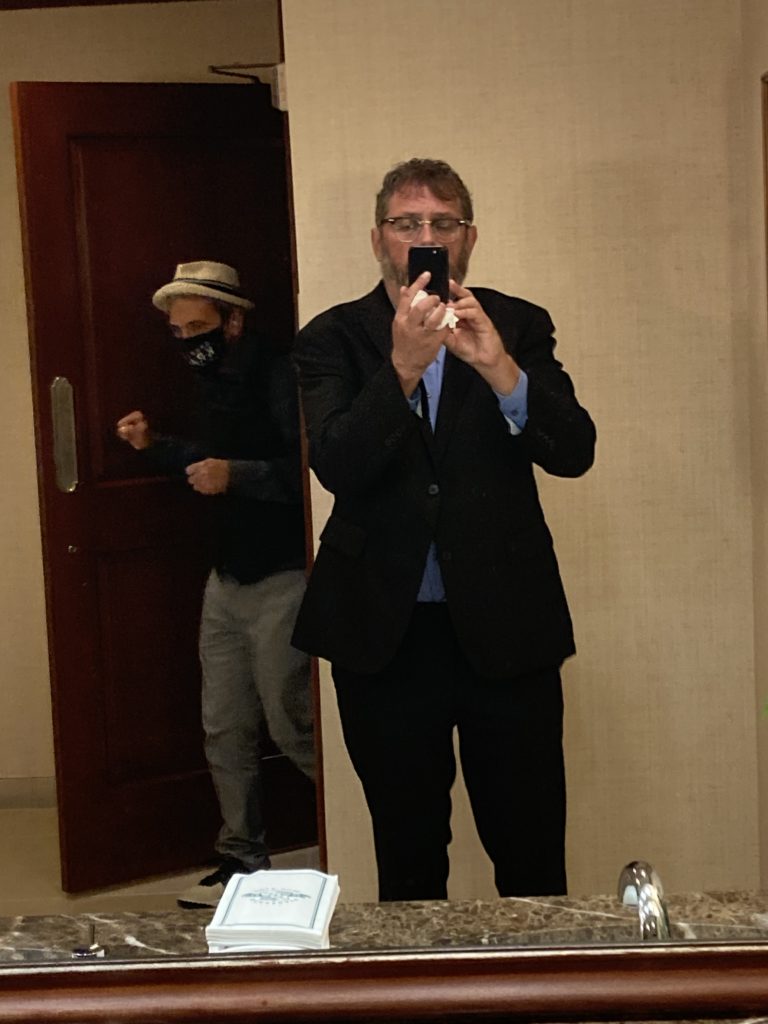
Review by Thomas Devaney
Pregrets
Anselm Berrigan
Black Square Editions
Anselm Berrigan keeps a notebook. He’s been filling them up at least since the mid-’90s. Roughly between 1996 and 2000, I saw him filling-up an undetermined number of these books. Though I can’t vouch for the ensuing 22 years, I can guess from reading the poems since then that he has kept-up this notebook practice.
Anselm and I know each other, or do well enough. We were students of Allen Ginsberg’s at Brooklyn College. (Allen who encouraged us to keep “secret scribbled notebooks”!) Berrigan’s book Pregrets is published by John Yau at Black Square Editions. Yau also published one of my books. So in terms of transparency, disclosure, and skin in the game—all of that, now you know.
I agree with Eileen Myles that it can be a delight (and even important) to write about a friend’s work. Writing about Tim Dlugos Eileen says, “people who understand something should write about it. Poets should review poets, for starters, because since there are hundreds and thousands of mini-subcults of us practicing, and you (the reader) might need a friend or a lover to open the door.”
It is true, especially for a poet who plays on the margins of sense and who delves into as many systems and deep wells as Anselm often does.
Over the years, one of the great pleasures has been to hear Anselm Berrigan read his poems. From their tenacity to their sardonic warmth, hearing the poems out loud has often helped me to perceive some of their deeply built-in structures and strains. (So go hear him read or seek out some of the recordings!)
One thing I’ve noticed in his beat-structure (the cadences) is that on the page there is clear forward motion, so the lines feel ahead of the beat. But when he reads, there’s also a combination of pushing right into the beat, and, at other moments, being a slight hair behind it. This change-up creates subtle tension and energy in Berrigan’s poems.
Besides plenty of ear-catching cuss words, my guess is that one of Anselm’s prerogatives is that a poem must look and sound great, which also works to convey the force of its own logics and counter logics. It’s possible to say that these values are a baseline from which many of his most supple and resourceful poems stem.
There are 76 poems in Pregrets, and the book is 104 pages. Most of the poems are either titled “Pregrets” or “Regrets.” A number of them are also titled “Degrets” and other playful variants include “Egrets,” “Megrets,” “Deflategrets,” and one poem that may be a bridge poem, titled “Re to Pre to De.” And for all the expansive variants, there seem to be scores of bona fide regrets, such as, “I spent more money on shampoo to get the goat clean than I did buying it.”
The poems are all around 25 lines long with no stanza breaks. So the stanzas in each poem look all but alike, but there is a great range in tone and approaches across the four sections. Somewhere—on a podcast?—Anselm says that he thought about the poem format as being “the same and different, at the same time.” Here is the first poem in the second section of the book:
Regrets
I told the apparently laten little box I was
slapping myself recursively, long live that down
with, the box frame, the howdy human condition
but I was relaying re to pre to avoid having to
admin it, but I was lying, like now I’m just trying
to remind your yous I can do this, being a thingless
telephat on the hill so as to speak as, give my love
to the air out there, the sets of smacktivated paces
I was ordered to kill a spider yesterday, more
pesticides for me and my roots, I should look up
the origin of out of the blue idiom, but you can
decoratively do it for me, with a sagacious hose
in the alley, an alley priming its pump in another
world, alas, sitting here in cold anonymity, someone
who doesn’t dig me, platonically, walks in werewolf
specific shirt rips, that wall is being red flashlights
called upon by irradiated day-glo yellow fold to sit
watching the game on radio, don’t you ever draw
on a napkin with my pen again you little winne
in the seventies the adults could raise money
during the day and still hate dinner, now we’re
supposed to be complex, never broke, and critically
violent while dissolving the masks of subjectivity
well, we are—you don’t have to care about that shit.
As states of being go, how about “the howdy human condition”? But the thing I started noticing in Anselm’s book is that its effect is working on multiple, large-scale macro levels. It’s tempting to use phrases like “the everything poem,” or the “everything book,” which are relevant. Still, I want to put a focus on ecosystems and economies, which are often discussed in macro terms and impacts and dynamics. It’s a rich space in which the poems are being staged, which I hope someone else might explore at greater length.
Is Berrigan’s decades-long notebook practice a factor? I think so. They are a deliberate and open-ended staging ground for the nascent poems to meditate chaos and complexity, among other things. Whatever their impact, there is a gathering principle felt in the force of the poems: “hideous hands kick off a/ stroll along a permanent wound’s perimeter.”
One way to read Pregrets is to embrace the staggering aggerate implications of its granular glimpses. Thus, Pregrets is a macro grunge opera at war with its states of separation. Berrigan writes: “I might
be dead later, I’m not expecting fragment bump, fall
away bump, pile on & still exude bump aura, reverse
the outer corners until specific arrival mandates itself
into existence, hi Satan, your schemes lack gmos & bpas
& rbis, & contested amphibian blunt imitations, yays
the re-ape for the Divine Mystery of the Universe is an
open secret, as I just got told by a firm, a rapid, a very
agreeable transparent, no, flesh-colored premise
Pregrets neither accepts nor rejects its own topographical shredding (the grunge register is relevant) but is continually rejoining its deepest dissonances as a way of wayfinding.
Click to read Elinor Nauen’s interview of Anselm Berrigan
ANSELM BERRIGAN (https://www.wavepoetry.com/products/anselm-berrigan) has been contributing to Boog publications and reading at Boog events since the late nineties, and in 2000 was the baseball editor for issue eight of their litzine Booglit. A chapbook, Shoe, or Tree?, containing the whole poem for Lewis Warsh, is forthcoming from Boog City.
Berrigan is the author of many books of poetry: from Wave Books, Something for Everybody, Come In Alone, and Notes from Irrelevance; from Edge Books Primitive State, Some Notes on My Programming, Zero Star Hotel, and Integrity and Dramatic Life; and Free Cell from City Lights Books. He is also the editor of What is Poetry? (Just Kidding, I Know You Know): Interviews from the Poetry Project Newsletter (1983–2009) and co-author of two collaborative books: Loading, with visual artist Jonathan Allen (Brooklyn Arts Press), and Skasers, with poet John Coletti (Flowers & Cream). His chapbooks include Pregrets (Vagabond Press), and Sure Shot (Overpass Books). He is the poetry editor for The Brooklyn Rail, and co-editor, with Alice Notley and Edmund Berrigan, of The Collected Poems of Ted Berrigan and The Selected Poems of Ted Berrigan (both from University of California Press).
A member of the subpress publishing collective, he has published Selected Poems of Steve Carey and Hoa Nguyen’s Your Ancient See Through. From 2003-2007 he was artistic director of The Poetry Project at St. Mark’s Church, where he also hosted the Wednesday Night Reading Series for four years. He is co-chair, Writing at the Milton Avery Graduate School of the Arts interdisciplinary M.F.A. program, and also teaches part-time at Brooklyn College. He was awarded a 2015 Process Space Residency by the Lower Manhattan Cultural Council, and in 2014 he was awarded a Robert Rauschenberg Residency by the Robert Rauschenberg Foundation. He was a New York State Foundation for the Arts fellow in Poetry for 2007, and he has received three grants from the Fund for Poetry.
He lives in the East Village, where he also grew up.

THOMAS DEVANEY (https://www.thomasdevaney.net/) is the author of You Are the Battery (Black Square Editions), Getting to Philadelphia (Hanging Loose Press, 2019). He wrote and co-directed the film Bicentennial City (2021) about the 1976 Bicentennial in Philadelphia. Patrick Montero photo.

